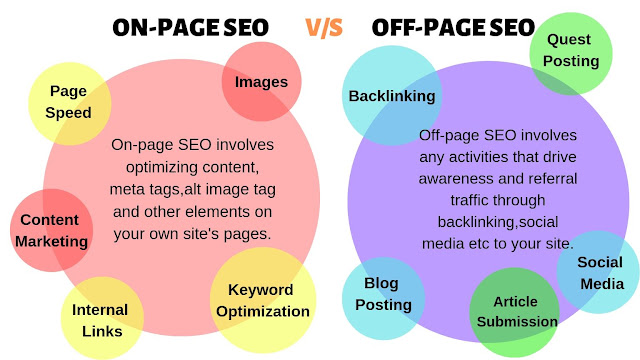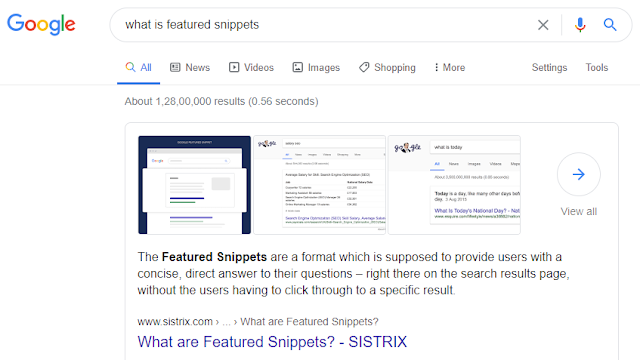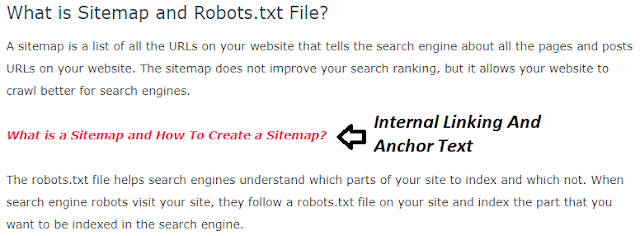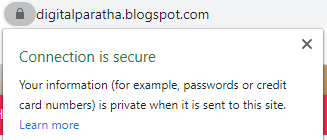The present-day many individuals ask what the thing that matters is between on-page and off-page SEO and which one has a more huge effect on site rankings.
The thing with SEO is one size never fits all, every situation is extraordinary and is dependent on the site.
On-page and off-page SEO are not similar things, how about we characterize what each is with a couple of examples and how to optimize each.
What Is On-page Search Engine Optimization (SEO)
On-Page SEO: On-page optimization is a strategy that is utilized for optimizing individual pages so as to rank higher and gain more significant traffic in search engines. In search engine optimization, like google, yahoo, bing on-page optimization alludes to a factor that affects your site and pages posting in the natural search results. The following is a rundown of the most basic on-page SEO factors:
1. Title Tag
Title tags tell search engines and visitors what the given page is about and establish significance. Title tags are one of the most significant on-page factors for SEO. There are best practices you can follow to improve the viability of your title tags.
Meta Title is unique to each page, contains the focus keyword, incorporates between 55 to 60 characters, and is written in a noteworthy voice.
2. Meta Descriptions
A meta description is a short passage of text that tells website visitors and search engines what the page is about.
Meta depictions were a basic factor for search engines in the past, anyway today, Google algorithm (AI) can decide the content and importance of the page. As a result, their criticalness has to some degree declined.
Google will make a meta description on the off chance that one is absent.
That expressed, grabbing searchers' eyes and getting them to tap on your link still depends upon the meta description, and it's best to make a profoundly applicable meta description yourself.
Meta descriptions are unique to each page, contain the target keyword, incorporate between 135 to 160 characters, and are written with an insignificant voice.
3. Keywords And Phrases
Keywords are one of the main attributes of on-page SEO.
Similarly, as with different signs, keywords help search engines to distinguish what a given page is about. Albeit, today, Google algorithm can figure out what a page is about without determining keywords today.
Investigating and building a list of keywords to target is one of the most basic initial steps in any SEO campaign, and is a progressing and ever-evolving process.
One of the most critical aspects of SEO is developing the initial list of keywords; this can be a harsh task, read more about some of the best practices.
4. Search Engine Friendly (SEF) URL
The following are two instances of search engine URLs, which one do you believe is the search and easy to understand one?
In the event that you said the second one, you are right. Google loves easy to understand elements. Most CMSs can produce SEF URLs. Give close consideration to guarantee that your URLs are optimized.
5. Heading Tags (H1 To H6)
Each site needs to focus on the user experience, and heading tags are no special case.
The H1 tag (headline) is one of the primary elements that website visitors see when landing on a webpage. Headings serve to promise visitors that they are in the correct place and have discovered what they're looking for except if you are rehearsing misleading content. Misleading content is the point at which the feature is utilized to attract the reader. Notwithstanding, the article has little reference. Misleading content drives clicks and not much else.
With the Google Hummingbird update, Google improved at responding to specific user questions.
Optimizing H1 tags for specific search inquiry and search goals manage you the opportunity for the page to be a featured snippet at the top of the search engine result page (SERP).
The following is a case of Google featured snippet:
The H1 for this page incorporates the expression "What are Featured Snippets?" and answers the search inquiry straight in the SERP.
6. Alt Text
Alt text alludes to the word or expression that can be credited to an image file to assist it with being indexed for searching. On the off chance that you utilize a realistic in your blog that traces some infusion molding tips, for instance, you can save the alt-text for that picture as "car-infusion-forming-tips", and that reality will begin to rank for that expression in the image results.
7. Internal Linking And Anchor Text
Anchor text is the text in a hyperlink that you click on. You see anchored links consistently, however you presumably didn't have the foggiest idea what they speak to with respect to SEO.
Anchor text links to pages inside, within a site. The enlightening keywords in your anchor text are basic elements to build up site architecture and assist spread link juice.
Linking inside to your site is perhaps the fastest approach to give your content a little boost and experience an SEO uptick.
8. Robots.txt
Robots exclusion protocol (REP), or robots.txt is a text file webmasters make to teach web crawler robots the pages to crawl and which pages not to crawl and indexed in search engine results.
Each bot has something many refer to as 'crawl budget' (this is the number of pages Google will crawl on a site on any random day).
The size of the crawl budget is reliant on the size of the site, the number of inbound links to the site, and the number of mistakes the bot experiences. In the event that the bot does not have enough budget to crawl your recently submitted or optimized pages, this will defer your SEO efforts.
That is the reason it's essential to ensure that archived pages — pages with meager, low-quality content, and copy content pages are not indexed permitting the crawl budget for the pages that issue.
Visit: To Know Detailed Information About What is Robots.txt File and How to Use It for SEO?
9. XML Sitemap
An XML sitemap lists the URLs for your site and goes about as a guide to the critical pages. A sitemap helps Google to discover the pages you esteem basic for your site and permits search engines to crawl the web page astutely.
Visit: To Know Detailed Information About What is a Sitemap and How To Create a Sitemap?
10. Website Performance
search engine optimization (SEO) is very much dependent on website performance; Google needs to rank sites that give a remarkable user experience higher. Page speed, mobile responsive design is pivotal variables in your site's presentation and affect your search rankings.
Google announced in 2010 that site speed was formerly a positioning factor in their algorithm. A slow site murders the user experience, contrarily impacts SEO, and will drastically affect your primary concern.
Various investigations have indicated that 40% of individuals will desert a site that takes over 3 seconds to stack. Consistently that goes before a page load expands the deserting rate.
Google likewise announced in 2016 that they were exploring mobile-first indexing. In 2018, they are making the hard move to a mobile-first index. This implies search engines will take a gander at the mobile version of a page's content to assess if it's pertinent to the user search inquiry.
This implies a responsive mobile site is more basic than ever.
On-page SEO makes a great deal of progress. Be that as it may, you need to invest your time and exertion where it matters most. The following is the anatomy of an effectively optimized page, the graciousness of Moz:
11. SSL/HTTPS
Page security is a higher priority than any time in recent memory in 2018, and empowering Secure Sockets Layer (SSL) security innovation is vital for improving your security, reliability, and permeability. By empowering SSL, you improve the probability that a third party doesn't separate your web server and the visitors' web server, guaranteeing that data entered on the website is safe. In like manner, Google really inclines toward destinations that are SSL-empowered, making it basic to boosting visibility.
What Is Off-Page Search Engine Optimization (SEO)
Off-Page SEO: Off-page optimization alludes to a method that can be utilized to improve the position of a site in a search engine results page (SERPS). Numerous individuals associate off-page SEO with link building yet it isn't just that. It is additionally utilized in advancement techniques like blogging, web design, social bookmarking, and so forth...
The following are the absolute generally off-page SEO procedures:
1. Manual Link Building
Manual connecting and requesting the link is the thing that manual link building is. These are not normally happening links. A genuine example is a point at which you request that a client link back to your site.
Another customary procedure is including influencers in content creation, referencing them in your content piece, or developing a point they talked about and requesting that they share it or link back to you in their next segment.
2. Self-Made Links
Site submission to directories, remarking on blogs, taking an interest in gatherings, and remarking while at the same time adding the URL of your site or a page on your webpage as a major aspect of your online mark, is on the whole instances of self-made links.
Doing this exorbitantly may procure you a huge punishment from Google, they may consider a portion of these activities as black hat SEO.
You have to ensure that your remarks and contribution to online communities and discussions are offering some benefit. They ought not to be spam or self-promotional with the sole reason to gain a backlink.
Just submit your sites to trustworthy directories with high domain authority.
3. Social Sharing
Social media doesn't have the SEO clout the same number of individuals may figure it does.
Google confirmed that social signs are not an immediate positioning element. Google couldn't care less what number of Twitter devotees, Facebook likes, or substance shares via social media when positioning a site.
Social media gives circuitous SEO profits by:
Expanded inbound links and brand specifies from online visibility.
Improved brand awareness from expanded brand presentation to a greater audience.
Social Media assist you to build a group of people for your site.
Albeit social media may not assume a direct role in site rankings, don't limit it. Social media empowers you to build a group of people for your website, and social selling drives income.
Social media can cause a content piece to go viral. A viral circle brings about individuals normally connecting back to you and referencing your brand.
4. Guest Posting
The guest posting includes benefits to SEO and your brand in general.
It's a success win. Guest posting takes a great deal of time and exertion. In any case, the ROI is magnificent. Guest posting ought to be a key role in your digital procedure. The following are a few perspectives to consider:
Sets your brand as an expert regarding your matter.
Extends your presentation and contact new crowds.
Guest posting drives genuine referral traffic.
Constructs a relationship with significant influencers and other eminent figures in your industry.
Guest posting can drive SEO and expands brand notices and backlinks to your site. The key is to make a significant substance that individuals want to read.
5. Brand Mentions
Brand mentions and finding unlinked brand mentions a reference to is an incredible link-building method, and it's a fundamental exercise for new sites to monitor brand specifics while attempting to assemble the initial 50 backlinks.
The most effortless way to monitor brand mentions is by utilizing third-party solutions like Mention or conveying progressed Google search commands.
When you've revealed sites that mention your brand, representatives, or originators, you can email them and courteously request that they incorporate a link alongside the brand mention.
This won't just get new backlinks, yet these mentions can bring huge amounts of referral traffic.
On-Page SEO VS Off-Page SEO: Which Is More Important?
On-page and off-page SEO cooperate to improve search engine rankings. By taking a shot at what you can control today—creating quality content that is upheld by high-quality on-page SEO—you'll be well headed to gaining backlinks, improving your domain authority (DA), and controlling your off-page SEO.















No comments:
Post a Comment